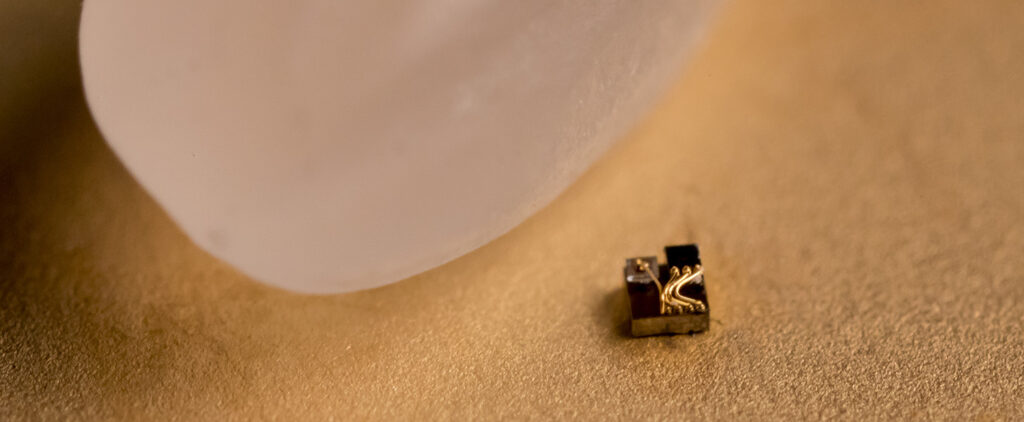Enabling stroke victims to “speak”: $19M toward brain implants to be built at U-M

A new collaboration between the University of Michigan and Stanford University aims to give stroke patients the ability to “speak” by detecting and interpreting brain signals, using the world’s smallest computers linked up to the world’s most biocompatible sensors.
The Marcus Foundation announced today a $29.7 million grant, led by Stanford, that would benefit victims of aphasic stroke, who are often left struggling to communicate. According to the American Heart Association, stroke is the leading cause of disability in the US. The National Institutes of Health estimated over 1 million Americans have aphasia and there are over 210,000 new cases per year. Damage to the brain impacts their ability to listen, write, read and speak, yet they retain their ability to understand others’ speech.
U-M researchers Cindy Chestek and David Blaauw will lead the design and construction of an implantable, long-term brain computer interface (BCI). Meanwhile, at Stanford, researchers will work with people who have had a stroke that impaired their ability to speak. They will evaluate whether they can “decode” words from other parts of the brain that were not affected by the stroke.
“The current electrode technology has been in use since the 1990s and it’s called the Utah array,” said Chestek, a U-M professor of biomedical engineering, electrical engineering and computer science, and robotics. “It’s an implantable electrode that can last from one year to seven. But that’s not reliable enough for a medical treatment, and the device can also create a lot of scar tissue in the brain.
“David and I are going to build a much better device, which will consist of a lot of tiny devices.”
Specifically, they are building tiny carbon-based electrodes that will record signals from the brain’s temporal region, which handles auditory information and language, and is usually intact in patients with aphasia. The electrodes used to pick up those signals are made of carbon fiber and are smaller than capillaries, doing very little damage to the brain over time—even when large numbers of them are implanted. A small computer chip attached to each carbon fiber will transmit the neural signal to the outside world.
“Our approach is completely wireless, and that distinguishes us from many of the interface technologies that are in the market right now,” said Blaauw, the Kensall D. Wise Collegiate Professor of Electrical Engineering and Computer Science. “By making it wireless and incredibly small, we’re making sure there’s little damage to the brain and it leaves the protective layer around the brain intact.”
Stanford’s work will be led by Jaimie Henderson, a professor of neurosurgery, and Frank Willett, an assistant professor of neurosurgery. The team ultimately plans to implant U-M’s devices into patients to restore speech.
“This research meets a critical gap as no existing therapies can restore speech in aphasic patients,” Henderson said. “We are embarking on something that has never been done before with this innovative project.”
Bernie Marcus, co-founder of The Home Depot, created The Marcus Foundation in 1989 to channel his philanthropic aims. Since that time, the foundation has issued more than 3,500 grants, backed by more than $2.7 billion in funding, to assist work in areas that include medical research, Jewish causes, free enterprise and veteran’s initiatives.
Last year, Forbes awarded Marcus and his wife, Billi Marcus, the publication’s Lifetime Achievement Award for Philanthropy. Bernie Marcus passed away Nov. 4, 2024.
“We are very excited to philanthropically launch this true ‘Dream Team’ in precision brain-computer interface research for aphasic stroke patients,” said Dr. Jonathan W. Simons, chief science officer at The Marcus Foundation. “As ambitious and ‘high risk’ as this academic R&D is, the ‘return’ in restoration of speech for those who have tragically lost it, exceeds any hyperbole as an advance in the neuroscientific care of stroke patients.”
Originally published on Michigan News and Michigan Engineering
 MENU
MENU 
